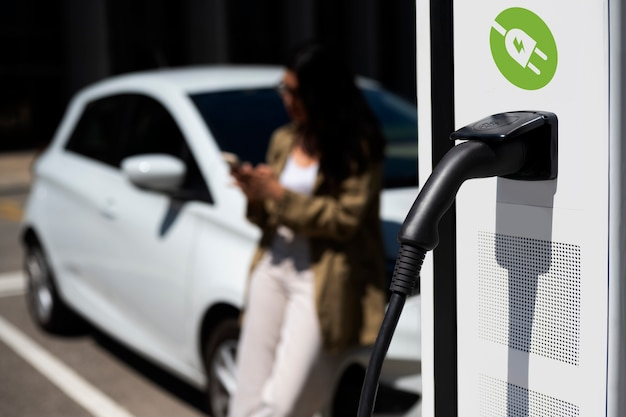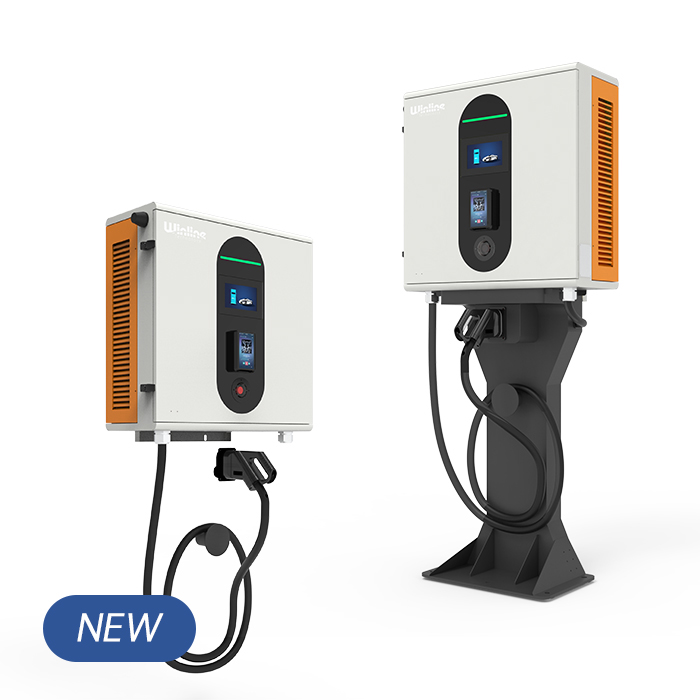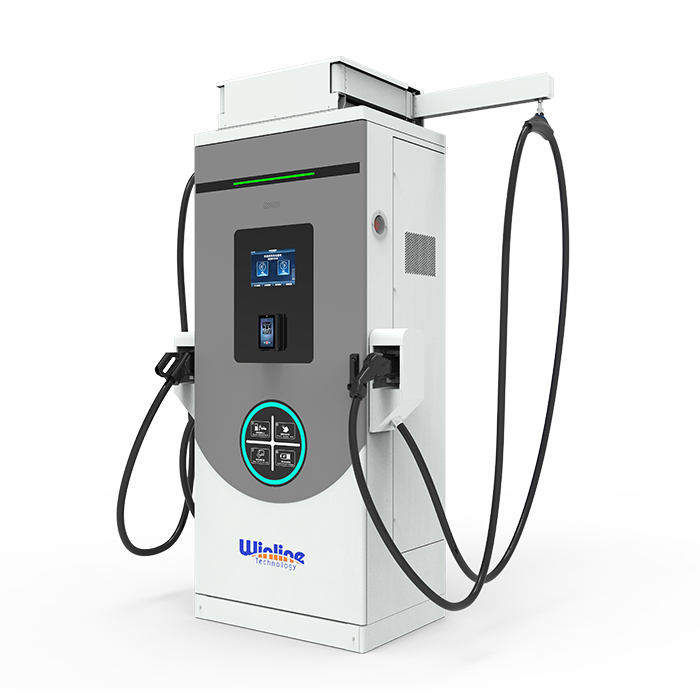As the worldwide fleet of EVs grows fast, advanced charging infrastructure is needed to charge quicker and more efficiently. For instance, high-power charging piles, like the 150kw DC fast charger, enable long-distance travel with one charge, while bi-directional charging stations are innovative solutions that manage energy flow between the grid and EVs.
As different types come with respective features, this article will focus on the AC and DC EV charging stations. These two common types of EV charging stations are widely accepted due to their respective advantages, and we will figure them all in this page!
What are AC EV Charging Stations?
Definition and Explanation of AC Charging Stations
AC charging stations are designed to charge electric vehicles (EVs) using the standard AC power supply available from the electrical grid. These charging stations are typically slower than their DC counterparts but are common for several reasons.
How AC Charging Works and Its Strengths
AC charging works by connecting the EV to the charging station. The trick lies in that the AC to DC power conversion happens in the converter built inside the car, called the onboard charger. Only when the grid power is transformed into the low voltage DC can it be stored in the car battery. Some AC charging stations’ strengths are:
Wider Accessibility and Compatibility
AC EV charging stations are compatible with a broad range of electric vehicles, as many EVs come equipped with onboard chargers designed to handle AC power. Moreover, they support standard AC charging connectors, such as Type 1 (SAE J1772) and Type 2 (IEC 62196). This compatibility ensures that EV owners have access to charging infrastructure at numerous locations without requiring specialized equipment.
Lower Installation Costs
Compared to DC charging stations, AC charging stations do not require additional equipment to convert AC power to DC on the spot. Additionally, since AC charging stations handle relatively low voltage, they do not demand the same high-power components as DC stations. Hence, they are generally less expensive to install and maintain.
Typical Use Cases for AC EV Charging Stations
Due to the above features, AC charging stations are popularly used in homes and workplaces with long-term parking. Home AC charging stations allow EV owners to conveniently charge their vehicles overnight or during off-peak hours, ensuring that their vehicles are ready for daily use. Meanwhile, workplace charging stations, typically located in parking lots or garages, enable employees to charge their vehicles while at work.
What are DC EV Charging Stations?
Definition and Explanation of DC EV Charging Stations
DC EV charging stations deliver DC electricity directly to the batteries of electric vehicles at a much higher voltage and current than AC charging. Compared to their AC counterparts, they shorten the charging time efficiently, which is crucial for long-distance travel and quick top-ups.
How DC Charging Works and Its Advantages
The DC charging stations bypass the car’s onboard charger. Instead, they incorporate a power conversion system within the charging unit itself. Such a structure yields DC charging stations many advantages, including:
High-power Delivery Capabilities
Typically, DC charging stations can deliver power in the range of 50 kW to over 350 kW, significantly reducing the charging time required for EV batteries. This ultra-fast charging capability renders them ideal choices for scenarios where time is of the essence.
Adaptation to High-power EV Trends
As EVs continue to evolve with increasing battery capacities and demand for faster charging, DC charging stations are well-positioned to meet these trends. They boast great potential to provide the necessary power to support next-generation EVs with larger batteries and higher charging requirements.
Preferred Scenarios for DC EV Charging Stations
DC EV charging stations are perfect for drivers who must minimize delays and resume travel immediately. They might be deployed at highway rest spots and urban quick charging stations. DC chargers can swiftly recharge EV batteries at highway rest breaks for long-distance driving. In urban areas, where time is tight, fast charging stations enable drivers to recharge their cars quickly during shorter pauses. It is excellent for those without overnight charging at home.
Top DC EV Charging Stations from Winline
Here at Winline, we offer leading AC and DC EV charging stations for diverse needs. You may have the following two top DC fast charging stations for a brief glimpse.
The Electree Cactus 30-40kW DC Charging Station is intended for destination charging settings with low rush but high-speed requirements. With an output voltage range of 200-1000Vdc, it is suitable for car charging in hotels, supermarkets, residence communities, and more. Plus, this charging station functions between -30 and +50°C for dependability in different climates. Importantly, its indoor/outdoor adaptability allows flexible installation.
This is a high-power 120-160kW DC fast charger meant for fast-turnaround settings, including service stations and fleet operations. This efficient charging station handles advanced car needs with CCS2 and CHAdeMO interfaces, peaking at 200A and 125A. With enhanced data calculation and processing capabilities, it optimizes the charging process. At the same time, safety is ensured due to a comprehensive protection design with active protective functions.
Conclusion
To conclude, understanding the difference between AC and DC EV charging stations is crucial to choosing the right charging station. Whether you require the convenience of AC charging or the rapid charging capabilities of DC stations, Winline has cutting-edge solutions for diverse needs.
Our technology corresponds to and exceeds worldwide standards with over 130 innovation patents and contributions to the CHAOJI charging standard. You can trust our expertise as our products have proved their reliability in around 40 countries and regions. If you have further thoughts on electric vehicle infrastructure, you are more than welcome to contact us!



